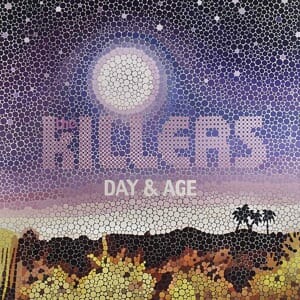
To be fair, the success of Brandon Flowers and co. has always relied on their sounding—and looking—a little other. On their chart-topping 2004 debut, Hot Fuss, the Vegas-based band seized on past trends like New Wave and glitzy ’70s/’80s glam rock, applying their own twist, and plenty of eyeliner. It was a surprise coup, but they established themselves as the “the” band of the mid 2000s and seemed poised to take over the music scene.
Then disaster struck in the form of 2006’s Sam’s Town. Sure, it sold a ton of copies. Sure, it got a couple decent reviews (though mostly from pubs who missed the Hot Fuss boat, and from Flowers himself). Sure, “When You Were Young” is featured on Guitar Hero. But the heavy guitars and Springsteen style rang false, even for a band that had built its sound on the shoulders of giants.
On Day & Age, The Killers get a second chance to make the sophomore album they should’ve made two years ago. And for the most part, that’s what it sounds like: The dance-y, synth-heavy vibe is back, starting with first single “Human.” It’s the kind of soaring tune that’ll have you spinning on the floor at the club—atmospheric filler, perfect for the band’s return to The O.C., if only it were still around.
But it’s not; and neither, for that matter, is pop innocence. In four years, just as The O.C. has been replaced by the snarkier Gossip Girl, OMG has become OMFG. The ingénue vibe won’t cut it anymore—not without irony—and certainly not on a second try at a follow-up. That’s the core of this musical melodrama: When Flowers belts out such disco-dipped lines as “Are we human / Or are we dancer” as he does on “Human,” is he embodying the height of ridiculousness, or does he have the best sense of irony ever?
If, for argument’s sake, we go with irony, then that means a song like “Spaceman”—a little ditty about an alien abduction that’s shaping up to be single number two—is the band at its most brilliant. It’s a nifty trick, both musically and narratively, to set a song in the great beyond, automatically granting it greater importance. (David Bowie—Mr. “Space Oddity” himself, and a huge Killers influence, did this first.) This approach offers the chance to experiment with musical combinations and slam the whole shebang home with a far-out breakdown.
But this doesn’t exactly play to the strengths of a band that is typically so literal. “It started with a low light / Next thing I knew they ripped me from my bed / And then they took my blood type / It left a strange impression in my head,” Flowers sings to open the tune. And when the climactic line is, “My global position systems are vocally addressed / They say the Nile used to run from east to west / They say the Nile used to run from east to west,” it makes the song both weirder (taking place not in another dimension but in Flowers’ head) and more conventional (complete with big breakdown line, repeated for good measure). “Neon Tiger”—another song The Killers have taken for a spin during recent shows—also has the feel of magical realism. For most singers, it’d be pretty hard to hit lines like “Give me rolling hills / Tonight could be the night I stand among a thousand thrills” in the character of a giant cat, not to mention singing it with as much gusto and gravitas as Flowers does, unless there’s at least a slight wink-wink, nudge-nudge in there somewhere. But for the Killers frontman, there’s not.
Not if you’re listening to the album the way the band wants you to—as a collection of melodies that produce neither a slice of the zeitgeist or a coherent story, but a feeling. Which raises the question: In an allegedly “post” society (post-racial, post-feminist), can rock ’n’ roll—a genre that’s always relied on knee-jerk reactions to what’s come before—be post-ironic?
If The Killers have their way, it can be, and producer Stuart Price—a Brit who recently had a hit with Madonna’s Confessions on a Dance Floor—helps them out. Besides the classic Killers accoutrements (keyboard and synth), there’s now saxophone (most notably on “Joy Ride” and album opener “Losing Touch”), Afrobeats (“This Is Your Life”) and steel drums (“I Can’t Stay”). It’s not so much an effort to defy categorization as an effort to be categorized, once again, as “other”—other than their contemporaries, other than their first two efforts. Other than you, most likely, want them to be. And it’s a hope, we can assume (based on Flowers’ healthy ego), that other equals better.
The album’s first four songs play well into each other, as good en masse as they are as singles—an increasingly rare feat in the iTunes age. When “A Dustland Fairytale” comes around, the momentum slows a bit and the album starts to enter the danger zone. The Killers aren’t afraid of big, and they’ve never met a weather metaphor or a devil reference they didn’t like. And, yes, parts of this album are just plain bizarre. Day & Age isn’t as genius as Hot Fuss, but it has enough merits to keep its makers hit-makers, albeit odd ones.
It’s this experimentation that keeps The Killers fresh, setting them apart from the crowd. They may occasionally miss the mark—this album will take a few listens before it’ll get your party started—but, in the end, listeners’ tolerance thresholds for the unexpected will determine who cuts out early and who makes it ’til last call.